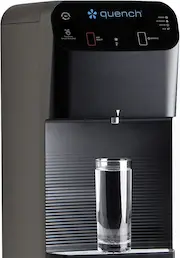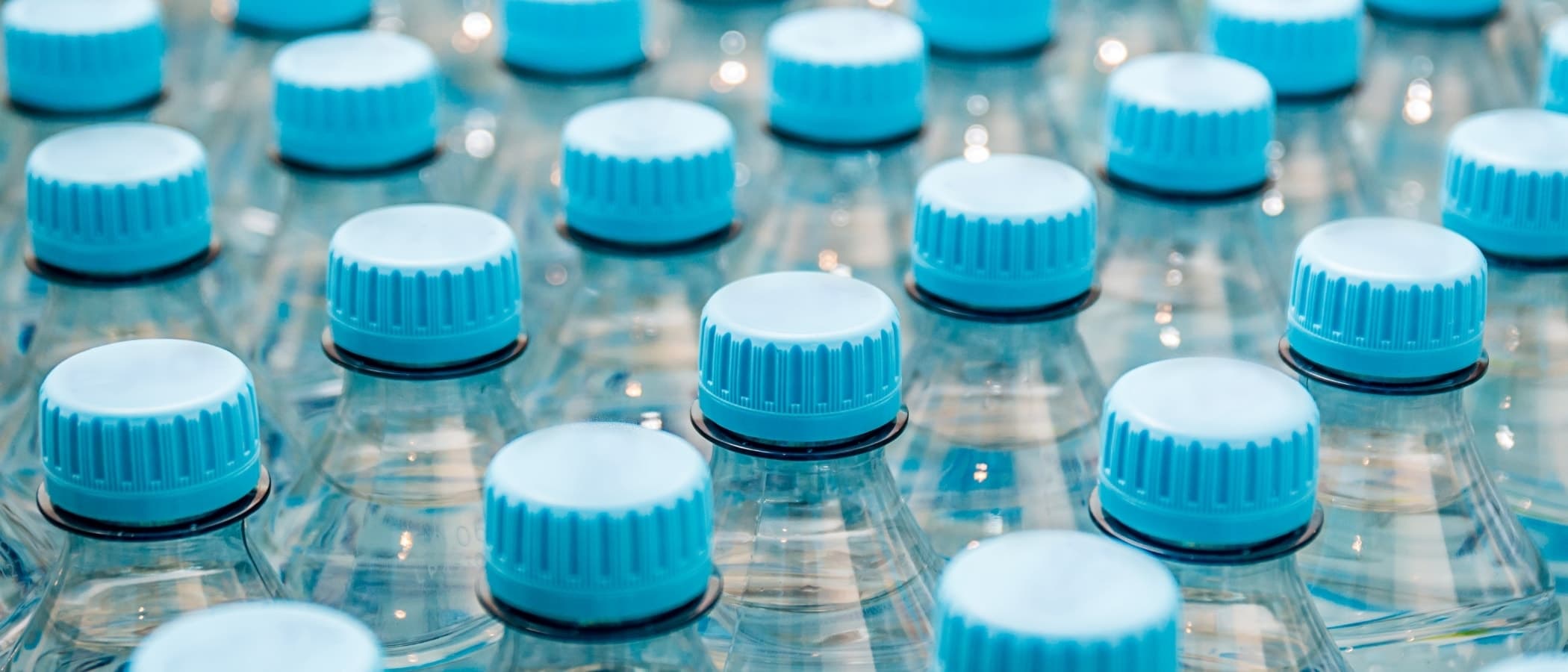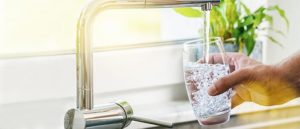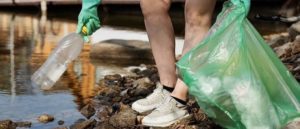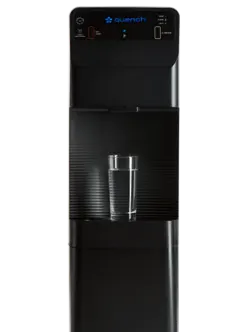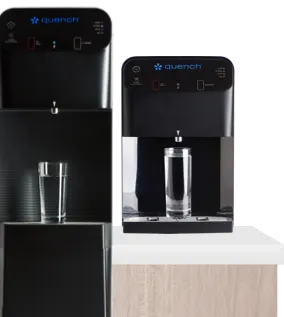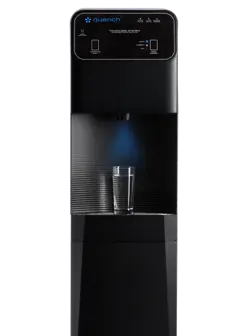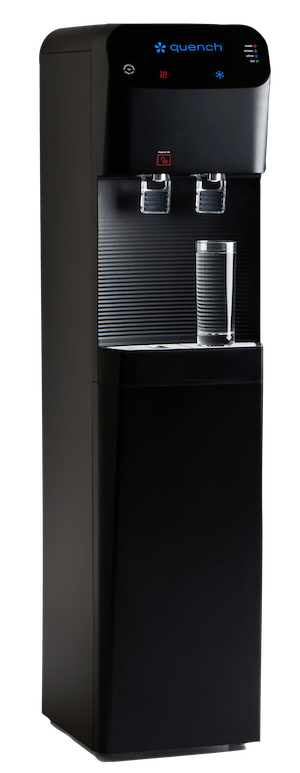LAST UPDATED: August 30, 2023
You’re committed to providing the safest possible working environment for your employees. For this reason, you offer plastic water bottles. After all, bottled water is supposed to be cleaner and safer to drink than tap water, right?
That’s what the majority of people think, but more research shows that bottled water isn’t always as safe as tap water. In fact, tap water is studied more often for contaminants than most bottled water. One study found that, when looking at several bottled water companies, at least two or more contaminants of potential concern for human health were in each sample, according to News Medical.
Municipal water treatment facilities operate on stricter guidelines than most bottled water companies. For instance, municipal water systems are required to notify their customers if contaminants are found in their local water supply. Meanwhile, according to the Environmental Protection Agency (EPA), bottled water companies don’t have to abide by those same strict standards. Bottled water companies are self-regulated and in charge of conducting their own tests. Contaminants are more likely to slip through the filters when looser restrictions are in place. It’s, therefore, important to know what you could be ingesting when you drink from a disposable plastic water bottle. That’s where your Quench Water Experts come in.
We’re here to provide you with the information you need to make more informed decisions about your drinking water. The following list highlights some of the most common toxins found in bottled water and the potentially harmful effects of a plastic container.
What’s Lurking in Your Bottled Water?
While no water is completely purified or without some form of imperfection, bottled water has been found to contain some dangerous substances when not audited regularly.
The Risk of Endocrine-Disrupting Chemicals in Your Water
Studies show that endocrine-disrupting chemicals (EDC) can leach into the contents of bottles made from polyethylene terephthalate (PET). PET plastic is the main ingredient in most clear plastic containers, including plastic water bottles. Traceable levels of EDCs have been found to leach into the contents of plastic containers kept in storage for up to 10 weeks, as reported by the National Library of Medicine.
Adverse health effects: When EDCs get into the body, they have the potential to affect development and leave the body open to a staggering range of diseases, including cancer. EDCs affect the body’s endocrine tissues, which produce essential hormones that help regulate energy levels, reproduction, growth, and development.
The Risk of Arsenic in Your Water
Although rare, arsenic has been detected in plastic water bottles in the past. Starkey Water – a Whole Foods’ brand – recalled more than 2,000 cases of plastic water bottles after regulators found traces of arsenic beyond the federally mandated threshold of 10 parts per billion. Whole Foods conducted follow-up tests that revealed the amount of arsenic in those recalled disposable water bottle brands was under the federal limit and could have caused adverse health effects if regularly consumed.
Adverse health effects: Regular consumption of heavy metals like arsenic can increase the risk of cardiovascular disease and certain cancers and lower IQ scores in children.
The Risk of Plastic Particles in Your Water
How about some plastic to go with your H₂O? A liter of bottled water from name-brand companies like Dasani, Aquafina, and Nestle can contain roughly 10.4 plastic particles, according to research done by Orb Media. That same study found that 93% of bottled waters contain “microplastic” synthetic polymer particles. That means there are tiny plastic particles swimming around in plastic water bottles that are nearly untraceable.
Adverse health effects: Plastic poses distinct risks to human health. Cardiovascular disease, cancer, and autoimmune conditions are just some of the harmful effects of plastic water bottles that contain microplastics.
The Risk of E. Coli in Your Water
E. coli are bacteria found in the environment, foods, animals’ intestines, and, in recent years, some bottled water as well. The National Library of Medicine found that E. Coli can survive in drinking water for four to 12 weeks if kept at the proper temperatures. In June of 2014, a water bottling company revealed that one of the springs they sourced their water from tested positive for E. coli. That discovery led to the recall of 14 bottled water brands.
Adverse health effects: Symptoms of E. coli poisoning include diarrhea, stomach cramps, pain or tenderness, nausea, and vomiting.
The Risk of Mold in Your Water
If your plastic water bottle was sourced from a well, then you might be at risk for mold in your water if the well cap was damaged or not properly sealed when the water was pulled from it. The fungus is more likely to be found in a plastic bottle during the warmer months, particularly in May and June.
Adverse health effects: If ingested, mold can lead to coughing, throat and eye irritation, and allergic reactions that may negatively affect your respiratory system and lead to other immune-related illnesses.
Making the Switch to Filtered Water Solutions
While the likelihood of getting sick from bottled water is low, it’s better to be safe than sorry when it comes to protecting your team. That’s why bottleless water coolers have risen as a top contender for drinking water in thousands of companies across the country.
Equipped with advanced filtration capabilities, this water solution delivers a cleaner, tastier, more cost-effective, and increasingly sustainable H2O source for workplaces.
When looking at price alone, bottled water may seem less expensive, in theory. But, in reality, one bottleless water cooler can save your company tons of money in the long run. And, a single water cooler can keep 7,000 plastic bottles or 150 5-gallon jugs from ending up in landfills each year. This is essential as Beyond Plastics reports that only ⅓ of water bottles get recycled, increasing the amount of plastic waste and chemical exposure in the country. The cost-effectiveness and sustainability of filtered water solutions alone can justify the switch.
On top of that, a point-of-use water cooler filters water on-site, rather than allowing pre-filtered water to sit at an off-site manufacturing plant, waiting to be used. This ensures your team members can always sip on crystal-clear water that tastes great.
A Quench Bottleless Water Cooler Is Your Answer to Clean Water
Instead of purchasing a potentially contaminated single-use plastic bottle, reduce water bottles and avoid the harmful effects of plastic water bottles by going bottleless. Bottleless water coolers (also known as point-of-use water coolers) hook up to a building’s existing water supply and filter the already treated public water a second time on-site.
Quench bottleless water coolers act as mini water filtration plants for your workspace. Many Quench water machines come fully equipped with several advanced water filtration and sanitization technologies, such as advanced carbon filtration, reverse osmosis filtration, ultraviolet sanitization, anti-microbial protection, and food-grade tubing.
A bottleless water cooler is not just safer than a disposable plastic water bottle, it’s more environmentally friendly. You can reduce water bottles in the office and save 7,000+ single plastic bottles a year from entering the environment every year by getting a bottleless water cooler for your business.
Interested in creating a healthier, more sustainable work environment for your employees? Give a Quench Water Expert a call. We’ll hook you up with the perfect hydration machines your employees will love. To get started, click the green “Get a Free Estimate” button and fill out a form, or call the sales number at the top of your screen!
